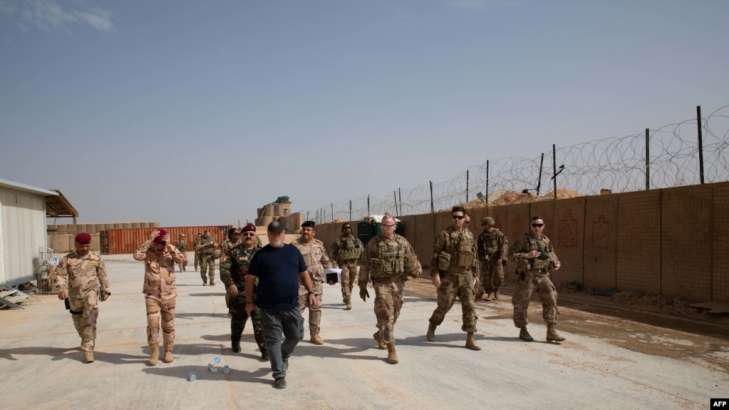
Photo: US command in Iraq shows the base to the Iraqi army aviation battalion/AFP
The United States announced an agreement with the Iraqi government on Friday to end its military mission in Iraq by early next year as part of the international coalition fighting the Islamic State group, the Associated Press reported.
The US troops will leave bases, some of which they have occupied for two decades, the Associated Press reported.
However, the Biden administration has declined to provide details on how many of the roughly 2,500 US troops still serving in Iraq will remain there, or to acknowledge that this would mean a complete withdrawal from the country.
“I think it's fair to say that, you know, our presence in the country will change,” Pentagon deputy press secretary Sabrina Singh told reporters on Friday, without elaborating.
The announcement comes at a particularly sensitive time in the Middle East, as the conflict between Israel and two Iranian-backed militant groups — Hezbollah in Lebanon and Hamas in Gaza — has escalated to the point that it threatens to escalate into a full-scale war. Bases housing American troops and contractors have been regularly attacked by Iranian-backed militants over the past several years.
The attacks intensified late last year and early this spring after Hamas militants attacked Israel nearly a year ago and Israel responded with a military offensive in Gaza.
For years, Iraqi officials have periodically called for the withdrawal of coalition forces, and formal talks on scaling back the U.S. presence in the country have been ongoing for months.
U.S. officials briefing reporters on Friday said the deal would lead to a two-phase troop withdrawal, the first of which began this month. In that first phase, which would last until September 2025, the coalition mission against ISIS would end and forces would abandon some old bases.
200% Deposit Bonus up to €3,000 180% First Deposit Bonus up to $20,000After the November elections, U.S. troops would begin leaving Ain al-Asad Air Base in western Iraq and Baghdad International Airport, according to Iraqi government officials who spoke to The Associated Press on condition of anonymity. Those forces would move to the Harir Air Base in Erbil, in northern Iraqi Kurdistan.
In the second phase, the U.S. would remain involved in some form until 2026 to support counter-ISIS operations in Syria, a senior Biden administration official and a senior Defense Department official said on condition of anonymity in a call with reporters.
Eventually, the U.S. military mission would transition to a bilateral security relationship, the U.S. officials said, but they did not indicate what that might mean for the many American troops who will remain in Iraq in the future.
Iraqi officials have suggested that some U.S. forces may remain at the Harir base after 2026, as the Kurdistan Regional Government would like them to remain.
“We have taken an important step in resolving the issue of an international coalition to fight ISIS,” Iraqi Prime Minister Mohammed al-Sudani said in a speech this month. He noted the government's “confidence in the capabilities of its own security forces, which defeated the remnants of ISIS.”
The continued presence of U.S. troops has become a political vulnerability for Mohammed al-Sudani, whose government is increasingly under the influence of Iran.
But critics warn that a surge in ISIS attacks in Syria this year across Iraq's desert border suggests the drawdown in Iraq is “a serious cause for concern,” said Charles Lister, a senior fellow at the Middle East Institute think tank in Washington.
The U.S. withdrawal from Iraq is not about the disappearance of ISIS, Lister said. “The withdrawal is because a significant part of the political community in Baghdad does not want U.S. troops on Iraqi soil,” he said.
The presence of U.S. troops in Iraq also makes it more difficult for Iran to move weapons through Iraq and Syria to Lebanon for use by Hezbollah. against Israel.
Prepared by: Sergey Daga

